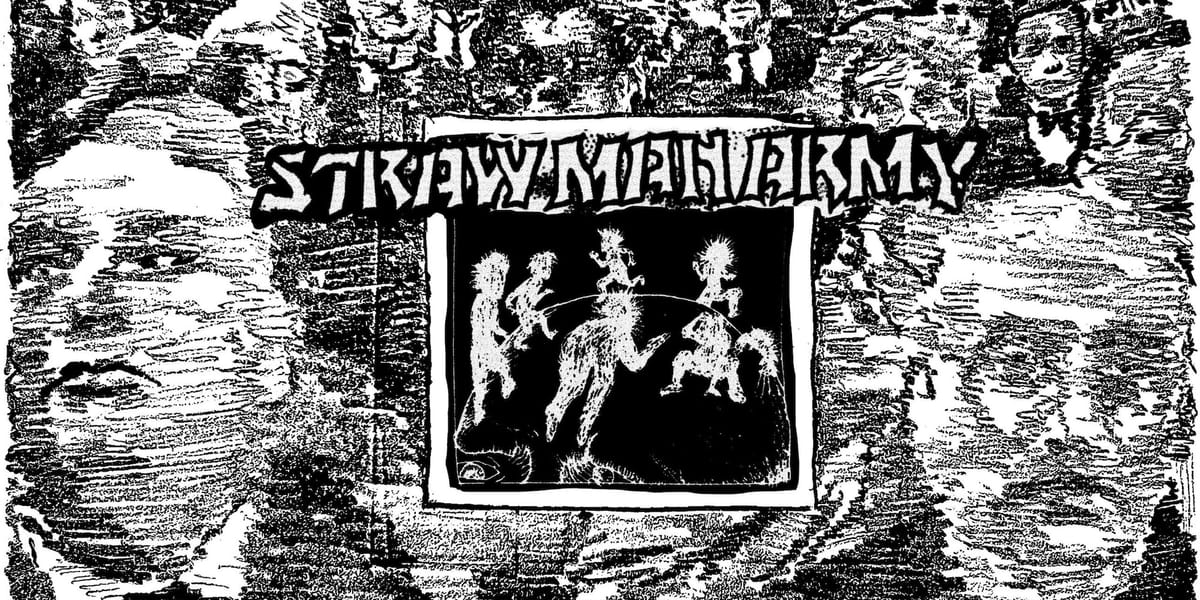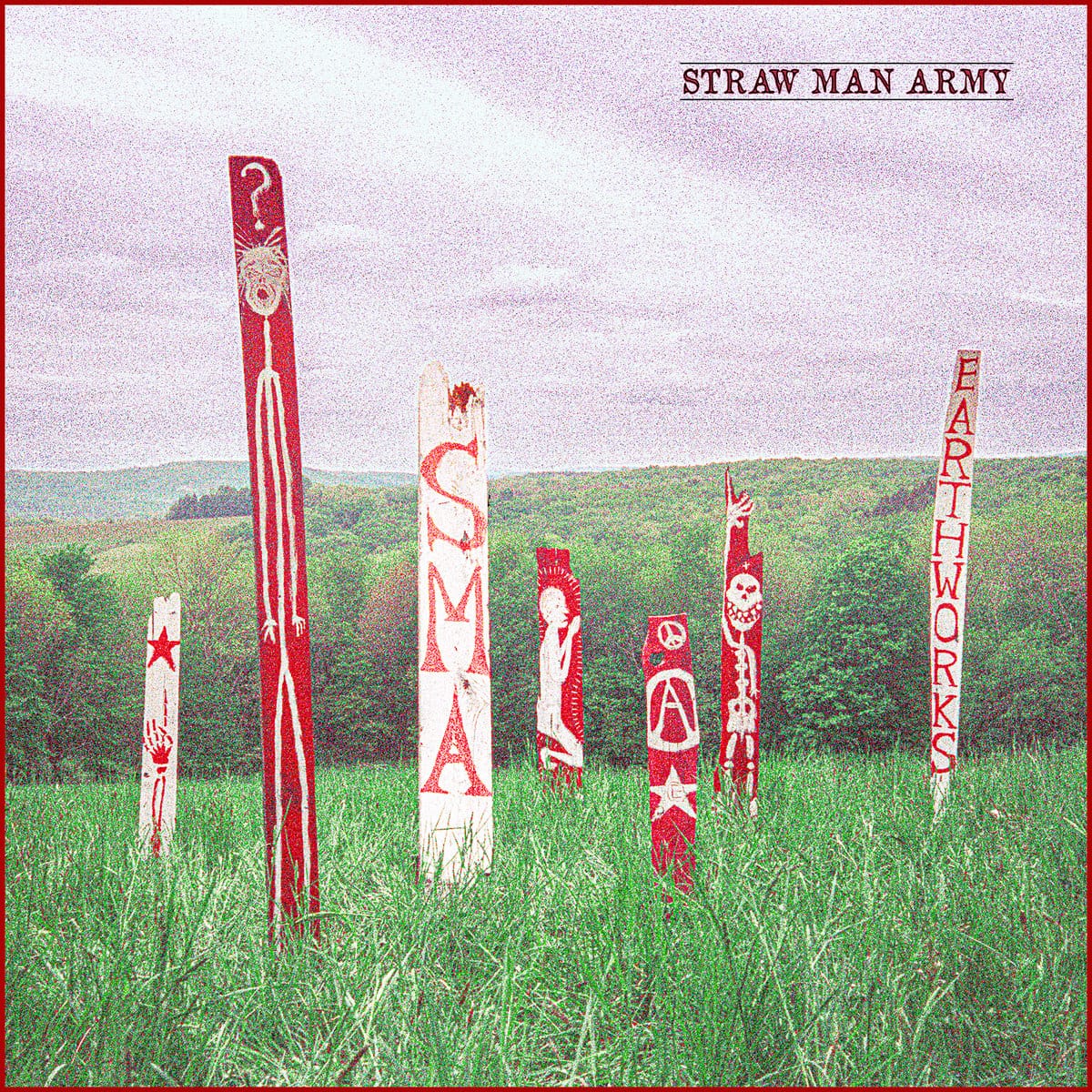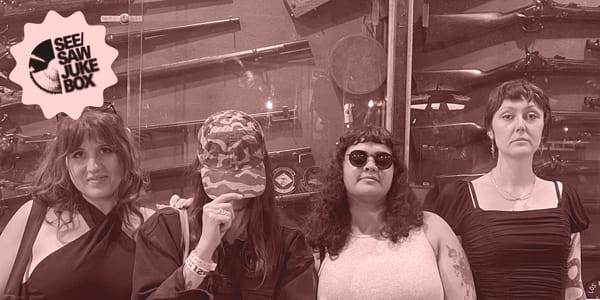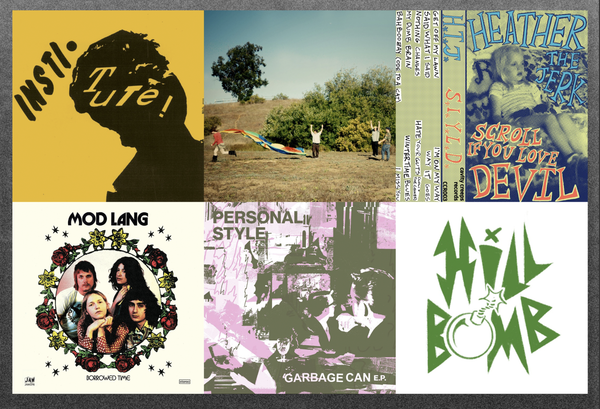straw man army reject the end times (but love the cemetery)
The duo of Owen Deutsch and Sean Fentress meet at a Brooklyn graveyard to discuss the future-facing final album in their trilogy

Owen Deutsch and Sean Fentress stood at the gates of Greenwood Cemetery in Brooklyn, just a few weeks before the release of Straw Man Army’s new album, Earthworks. Unlike most bands on the eve of a highly anticipated release, the duo were in good spirits, Sean citing their practice of meditation and regular time spent in Greenwood. It was the band’s idea to meet there, as it had become habit for them to walk the grounds at least once a week—a peaceful refuge from the city and its daily noise.
Straw Man Army’s debut, 2020’s Age of Exile, marked the first in a trilogy on Western failures, first struggling with the legacy of colonialism. The second album, 2022’s SOS, came as a result of the pandemic, based on the present state of “tech COVID nausea, as Sean put it.” The conclusion is Earthworks, the future-facing album, a natural progression for the band but a foreboding one for society at large.
The duo are both well-spoken and tall, Sean with lots of hair, and Owen with less. Sean wears a studded denim jacket and Owen a leather biker, same as me. His has a Crass button. “Someone who likes Straw Man Army works with Crass and gave Penny Rimbaud an advance listen to the new album,” said Owen. “He was like, ‘Hey I think these lads are onto something, it’s not the sort of thing I listen to now but it’s probably the sort of thing I would have put on Crass Records.’ And that’s just all you’ve ever wanted to hear.”
As a band, their sound is inspired by punk’s great experimenters: This Heat, the Pop Group, but also CAN and Pink Floyd, a love of which the two bonded over after meeting in high school outside of Chicago. Their formative moments were spent playing covers in their parents’ basements. “Honestly it didn't even cross our minds to go, let’s start a band and get our names in there. It was truly just playing together for many years,” said Sean.
Once Owen moved to New York and joined the hardcore band Kaleidoscope it was inevitable that Sean would follow suit. After a friend encouraged the duo to release their demos, Straw Man Army reached its proper form. “It was a long time coming, many years in the making,” said Owen. “We found a sweet spot to be ourselves, where we can come together without changing who we are at all.”
The two seemed at home in the cemetery, giving me a personal tour of their favorite graves. We eschewed marked trails in favor of hills, romping through grounds that mark decay for some, but life for the band, who noted great poetry and artwork for future etchings. One headstone was engraved:
NO POWER IN THE VERSE CAN STOP ME
MILES CLAUDE CALVERT
17 OCT 2005 - 14 OCT 2005
A life that lasted negative three days. We settled on top of a sun-drenched mausoleum to chat about the album, and for 45 minutes, while discussing the impending doom of global warming and social strife, the world felt at peace. It was too good to be true, as the wind rendered most of the audio unintelligible. (These are the struggles of journalism the experts don’t warn you about.) But Sean and Owen are class acts and were kind enough to later rehash the missing answers while it was still fresh in their minds.

Earthworks is the final album in your trilogy on what I’m calling Western failures. When you wrote the first of this group, 2020’s Age of Exile, did you have a vision for where the story would go or has it developed over time?
Owen Deutsch: I like that you call it Western failures. “The myth of the West/face down in our debts” is something we look at every day and are asked to reconsider. When we wrote Age of Exile there wasn’t such a long-range intention. We were spurred on by a feeling that the world around us, specifically the landscape around us, was haunted by the past—by genocide and theft and lost wisdom. We wanted to explore that notion through music and deliver a feeling. I think the feeling ended up being tender and angry. When we wrote SOS we were responding to the crisis of 2020 and 2022. The present moment is the crucible for the expanding complexity of the past and the shrinking of the future. That made us feel like this was going to be a trilogy based on temporality. Trying to understand time and ourselves in it. So Earthworks had to set its sights on the future, or at least address it open-eyed.
Sean Fentress: Yeah it wasn’t until we were writing SOS that this three-times trilogy model—past, present, and future—came into focus as a natural direction for a third LP to continue in. Our hope is that the future gaze held in Earthworks is clear but not heavy-handed.
What was it like to have your 2022 album SOS blow up as much as it did? Did you feel pressure to match that same level of hype on this album?
Owen Deutsch: It was weird. We have no real internet presence. I’ve never been on Instagram. I’m just hoping people in the music scene and friends are sharing it around. And that’s sort of what the press amounted to: enough people in DIY music who cared to share their thoughts on it. It just reached the right people to get some press. I certainly care about people hearing it. I feel I’m lucky to care because one of the goals with Straw Man Army is to connect with people emotionally. That’s important to me. As for matching the hype on Earthworks, I just want it to feel like it develops the trilogy and demonstrates growth. A shift in scope and scale. What comes after is up to how people connect with it.
Sean Fentress: The shine SOS got from a few platforms that reach way outside our microcosm was mystifying to us, but also exciting. Like Owen said, we want people to hear these songs. I’d say we experienced some minor head trips around Earthworks living up to the first two LPs, but in the process of recording pretty quickly came to rest in feeling this was a record we could be proud of. I personally think it’s our strongest yet.
What were some of your literary and critical references when crafting Earthworks and its political ideology?
Owen Deutsch: The important texts for me on Earthworks were Phil Neel’s Hinterland and Breathing by Franco “Bifo” Berardi. Hinterland tells a kind of cosmic story about the transformation of the physical and social landscapes of capitalism through the figure of sprawl, rust belts, flight, and investment. It helped me think about territories of the market and their inscription on the land. Incredible images in that book make you want to move through the world with a poetic lens. Stories of urban squatting, mudslides, the new fire and disaster economies of the northwest, and the shifting “gods” in this frontier of capitalism. Bifo’s Breathing helped me understand, to quote our own band [laughs], “The rhythm of breath/the rhythm of sudden death” and the dissolution of attention into languid, fugitive streams of dispersal. We are forgetting how to breathe when the rhythm of finance has shaken our bodies into new kinds of organisms. Panic and chaos. Additionally, I loved reading Pascal Quignard’s Roving Shadows and Hatred of Music, check those out.
Sean Fentress: I’ll just add that I’ve been studying Tibetan Buddhism for the past few years, and tried to bring ideas from that tradition into Earthworks. For example, our fundamental confusion as something to be first acknowledged, and then skillfully transmuted, so that we can offer something more to the world. Attempt to at least.

“Extinction Burst” was the other single, a chant on the end times, tell me about how this one came to be.
Owen Deutsch: I guess we refuse the idea of the end times. An extinction burst is a term I found after typing in “things get worse before they get better” into Google. I was trying to understand the mystery there—the need to make good work with bad news. Extinction burst came up as a term in child psychology referring to a temporary increase in the intensity, duration, or frequency of an unwanted behavior that occurs when reinforcement is removed. It's a part of the extinction process, which is used to reduce or stop behaviors that have been rewarded in the past. This is what we called the “storm before the calm.” Like a kid with candy taken away, the world is enacting a tantrum, where genocide and ecocide and fascism are its desperate actions, and we want to believe this is a death rattle of a dying order.
Sean Fentress: There’s a hopefulness in “Extinction Burst” that I hope comes through. That’s what we hope we’re seeing in all these unbearably bleak and painful realities unfolding on Earth today.
I’m interested in “Staring at the Sun” because this track addresses New York directly: “A charnel ground/a wound that blooms and claws the sky.”
Sean Fentress: The charnel ground is historically where people dispose of their dead, cemeteries, cremation grounds, etc. Over time it evolved to convey any space that repels or inspires fear, places where suffering and decay are highly visible. There is a tradition in Tibetan Buddhism of doing one’s practice in charnel grounds precisely because of the fear; you lean into the aversion. There are beautiful practices around making offerings to the surrounding spiritual ecosystem, hungry ghosts, and lost spirits, hoping to satiate forgotten beings and move stuck energy.
Owen Deutsch: We wanted to address our surroundings. National Guard in the subway, Eric Adams’ policing, his public disinvestment. The anti-human agenda of the real estate market. The engineering of suffering that makes this city a charnel ground, in the sense that it plays home to so much death, to suffering, and is a kind of stage for a particularly American blindness. I don’t mean physical vision as much as spiritual. Our hunger for self-help and wellness markets has certainly increased as the shadow of occupation and incarceration has deepened across the country and across the globe. I think there must be a relationship between this commercial focus on personal “liberation” against the erosion of collective power and the undermining of people’s movements.
“Blueprint” was included in the recent Peace of Mind in A Troubled World compilation for Palestine. Was that a demo? How did you get involved with that comp?
Owen Deutsch: “Blueprint” is one of our many Garageband experiments! From the land of our movie scoring ambitions that ended up on our album Her Majesty’s Ship OST which was a soundtrack to Charles Darwin’s The Voyage of the Beagle. We need to make music when we can’t get in the studio so we do a lot of sampling and “Blueprint” is one of those tracks which came out of messing about on the computer. I got involved with Peace of Mind because they’re close homies and I recorded a bunch of those bands and the songs on the comp at D4MT LABS: Flower, SMT, Love & Compassion, etc. We asked if we could set the mood for the comp with our version of an NYC soundtrack.
“Spiral” from the new album is also on that comp, and I think the lyrics make the message pretty clear: “NYPD, KKK, IDF, they’re all the same.” Do you want to expand on this one?
Sean Fentress: The spiral of violence was one of the first big images in our embryonic notes for Earthworks lyrics. Can our species reverse the orbit of what is clearly a path to total destruction? It’s a choice and it’s always been.
Owen Deutsch: I grew up Jewish and part of a reform temple. We met in different community centers so as not to have a permanent home. This is my ingrained view of Judaism (though I’m not practicing), as a roaming spirituality, and I think any attempt to occupy and forcibly displace (i.e. Zionism) is another name for ethnic cleansing and colonial activity. Naming is a powerful matter. We’ve heard that chant in the streets. It rings true that all three acronyms are at the service of mostly white settlers’ goal to control the narratives of crime and belonging, mete out punishment, and to create their enemy in the image of their obstacle to the fantasies of purity and ownership. The key part of the lyric you're missing is that we say: “They’re all the same/just different names.” We gotta call it what it is. Where is the lie?
Is there a particular song you’re most excited for people to hear?
Sean Fentress: I’m excited for folks to hear the last two, “Turn the Wheel” and “Earthworks”. There’s an emotional release in that pair that I hope is as cathartic for listeners as it is for us.
Owen Deutsch: I want people to experience the end of “Downwind” and feel the movement from chaos to peace.

Are the cover visuals all done by you two?
Owen Deutsch: Yes! We had many ideas about art. All three covers for this trilogy were to be landscape images, to invoke our sense of haunted landscape and to project the depths of time. We went up to our friend Dave’s farm in Liberty, New York and got stoned and painted all these boards from a collapsed barn. We made an “earthwork” in the land-art sense, but also a kind of Straw Man Army graveyard. We were able to keep it punk but make it lush and oblique. I like looking at it.
Sean Fentress: Just a fun fact, the skinny wooden plank figures standing in a field is one of those art visions that we first started imagining years before there was a Straw Man Army, as teens in my parents’ basement. It’s a rare joy when an idea hovers in the ether for 10 years and then one day comes into form.
Once the album comes out, what’s next for Straw Man Army?
Owen Deutsch: Great question. This is what we do together. And it's spiritually rewarding to make this music and think through our personal and collective lives with this music, or attempt to. But really we would love to score movies. Hit us up for that, please.
Sean Fentress: I’m excited to cut the leash to this trio of albums, explore other realms, be playful, write and record on the spot instead of baking songs for a year or more. And yes, please let us score your film.
Sydney Salk’s work has appeared in Paperface; find Sydney on Instagram.
see/saw is a reader-supported publication. If you enjoyed this article, please consider a subscription to support this independent punk journalism operation.





